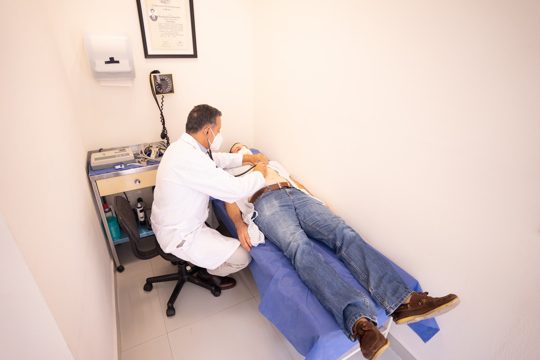Rheumatic Heart Disease
Rheumatic heart disease (RHD) is a type of congenital heart disease caused by an infection of the heart muscle and valves. It affects the circulatory system, the cardiovascular system, and can lead to ischemic heart disease.
Rheumatic heart disease can cause permanent damage to the heart, including thickening of the heart valves, which can lead to heart failure. It is often characterized by chest pain, shortness of breath, fatigue, irregular heartbeat, and palpitations. People with RHD may also have difficulty with physical activity.

In severe cases, it can cause stroke or heart attack. It is important to take preventive measures such as getting vaccinated against the bacteria that cause RHD, maintaining a healthy lifestyle, and managing any underlying conditions such as diabetes, high blood pressure, and obesity.
Early detection and diagnosis are essential in order to receive timely treatment and to reduce the risk of developing complications. Appropriate medical management and lifestyle modifications can help slow the progression of the disease and improve overall quality of life.
How Rheumatic Heart Disease Develops
RHD is caused by a bacterial infection, usually Streptococcus bacteria, that causes rheumatic fever. Rheumatic fever is an inflammatory disease that affects the heart muscle and valves.
If left untreated, the inflammation causes damage to the heart valves, which leads to RHD. RHD can have serious long-term consequences if left untreated, including stroke, heart failure, and even death. In some cases, the damage caused by RHD can be reversed with prompt medical treatment. However, if the damage is severe, it may require surgery to repair the damaged heart valve.

There is also a risk of the infection spreading to other parts of the body and causing further complications. Treatment for RHD consists of antibiotics to eliminate the infection, anti-inflammatory drugs to reduce inflammation, and medications to control pain and other symptoms.
In some cases, lifestyle changes such as quitting smoking, reducing alcohol consumption and following a healthy diet may also be recommended. It is important to seek medical attention as soon as possible if you suspect you may have RHD, as early diagnosis and treatment can help to reduce the risk of long-term complications.
Symptoms of Rheumatic Heart Disease
The symptoms of RHD vary from person to person, but they can include chest pain, shortness of breath, fatigue, palpitations, and irregular heartbeats. In more severe cases, the heart valves can become severely damaged and cause heart failure.
In some cases, the valves can become so damaged that the person may experience a heart attack or stroke. Medications can be used to help manage the symptoms of RHD, but in many cases, surgery is necessary to repair the damaged heart valves. When surgery is required, it is important to seek the advice of a cardiologist to determine the best course of action. For those who need surgery, there are a variety of options available.

Open heart surgery is one of the most common types of surgery for RHD, but there are also minimally invasive procedures which can be used to repair the valves without the need for open-heart surgery. In either case, the goal is to restore normal heart valve function and improve quality of life.
Additionally, lifestyle modifications such as diet and exercise can help to reduce the risk of complications and improve overall health. With proper management and treatment, individuals living with RHD can enjoy a full and active life.
Diagnosis and Treatment of Rheumatic Heart Disease
RHD is usually diagnosed through a physical exam, an electrocardiogram (ECG), and an echocardiogram (echo). Treatment for RHD typically involves lifestyle changes such as quitting smoking, controlling cholesterol levels, and avoiding activities that can cause further damage to the heart.
Medications may also be prescribed to control symptoms. It is also important to take steps to reduce the risk of further heart damage, such as getting regular physical activity, practicing healthy eating habits, and managing stress.

Regular check-ups with your doctor are also recommended to monitor your heart health and adjust medications if necessary. In some cases, surgery may be recommended to repair damaged heart valves.
The goal of treatment is to manage symptoms, reduce the risk of complications, and improve quality of life.
Preventing Rheumatic Heart Disease
The best way to prevent RHD is to get vaccinated against Streptococcus bacteria. Good hygiene, such as washing your hands often and avoiding close contact with people who are sick, can also help prevent the spread of infection.
If you have had a strep infection, it is important to take antibiotics as prescribed to prevent further complications. It is also important to avoid sharing eating utensils, cups, or other items with people who have strep throat. Additionally, it is important to cover your mouth and nose when you sneeze or cough to prevent the spread of germs.

It is also important to practice healthy lifestyle habits such as getting enough rest and eating a balanced diet to help boost your immune system. Additionally, you should avoid smoking and excessive alcohol consumption, as these can make you more vulnerable to infections.
Finally, if you are around people who have strep throat, it is important to wear a face mask to prevent the spread of infection. By taking these simple steps, you can help protect yourself and those around you from RHD.
Living with Rheumatic Heart Disease
Living with RHD can be challenging, but there are ways to manage the symptoms. Eating a healthy diet, exercising regularly, and avoiding activities that can put strain on the heart can help maintain good health.
It is also important to follow your doctor’s instructions and take any medications as prescribed. Additionally, getting enough sleep, managing stress, and learning relaxation techniques are all important for maintaining a healthy lifestyle.

Making sure to stay connected with family and friends is also important, as social interaction can reduce stress and provide support. Additionally, staying informed about any new treatments or technologies available can help those living with RHD to enjoy a better quality of life.
Finally, it is important to remember that RHD can be managed and that there are resources available to help.
Rheumatic Heart Disease and Ischemic Heart Disease
RHD can increase the risk of developing ischemic heart disease, a condition in which the arteries become narrowed or blocked, preventing the flow of oxygen-rich blood to the heart. In severe cases, ischemic heart disease can lead to a heart attack or stroke.
People with RHD should take steps to reduce their risk of developing ischemic heart disease, such as controlling cholesterol levels and not smoking. In addition, they should engage in regular physical activity, eat a balanced diet, and maintain a healthy weight. These steps are essential to helping lower blood pressure, prevent plaque build-up in the arteries, and reduce cholesterol.

Along with these lifestyle changes, people with RHD should also be sure to monitor their condition closely with their healthcare provider. Regular check-ups and tests can help identify any developing heart issues early, so that appropriate steps can be taken to prevent progression to more serious forms of heart disease.
Taking proactive measures to manage RHD can help people stay healthy and reduce the risk of complications.
Conclusion
Rheumatic heart disease is a serious condition that can lead to life-threatening complications. It is important to be aware of the signs and symptoms of RHD and take steps to prevent it.
If you have RHD, it is important to follow your doctor’s instructions and take any medications as prescribed to help manage your condition. It is also important to take steps to reduce your risk of developing RHD. This includes quitting smoking, maintaining a healthy blood pressure, and managing any chronic illnesses.

Additionally, if you have a family history of RHD, it is important to be aware of the symptoms and see your doctor for regular checkups. Furthermore, if you notice any signs and symptoms of RHD, such as chest pain, fatigue, or difficulty with breathing, it is important to get medical attention as soon as possible.
Taking these steps can help to reduce your risk of developing serious complications from RHD and can help you to lead a healthier and more comfortable life.
About us
Welcome to HealsHub! Your go-to source for all things related to health and wellness! We're here to help you lead a healthier, happier life by providing you with the latest news, research, and advice on topics like nutrition, fitness, mental health, and more. Our mission is to empower you to take control of your health and well-being through education and inspiration. Whether you're looking to lose weight, build muscle, manage stress, or simply learn more about how your body works, you'll find everything you need right here on healshub.com. We believe that everyone deserves to live a healthy, fulfilling life, and we're committed to providing you with the tools and resources you need to achieve your goals. So take a look around, explore our articles and resources, and start your journey towards better health today!

